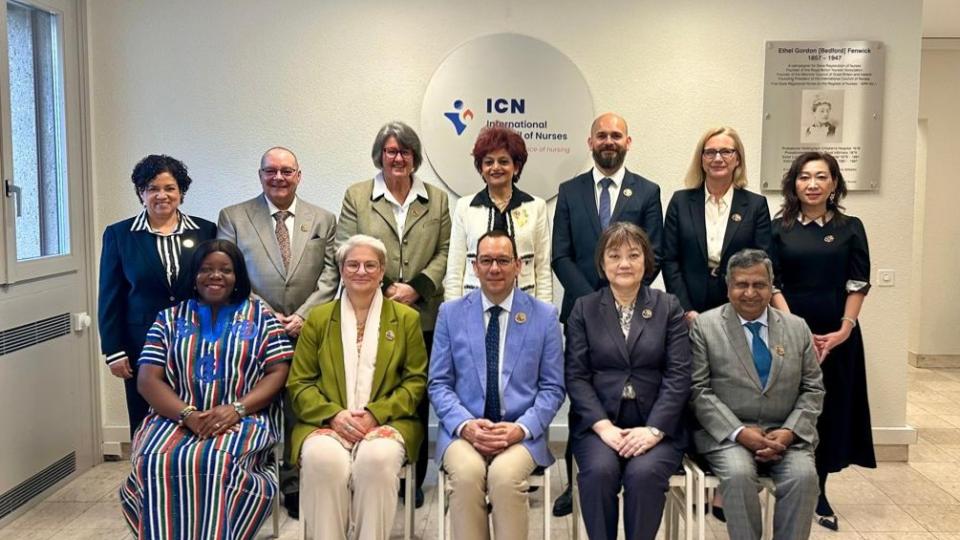ICN supports American Nurses Association in warning against limiting graduate nursing education funding

The Board of the International Council of Nurses (ICN), meeting this week in Geneva, expressed its deep concern around proposals from the U.S. Department of Education to remove nursing from the list of recognized professional degrees eligible for full federal loan support. ICN supports the American Nurses Association (ANA) position in opposing this reclassification, which would severely restrict the loan and loan-forgiveness options available to graduate and advanced practice nursing students, with significant negative implications for both the nursing workforce and patients’ access to health care.
ICN is speaking out because developments in the United States reflect challenges seen across the global nursing workforce. Countries everywhere are grappling with nursing shortages, high burnout, workforce ageing, insufficient nursing faculty, and an urgent need for stronger career development and retention strategies. The U.S. is not immune from these pressures; in fact, its current shortages of advanced practice nurses, faculty gaps, and persistent workforce losses mirror the patterns identified in many countries. Restricting funding and access to graduate-level nursing education in any major country risks negatively impacting health systems more broadly at a time when investment is urgently needed.
This issue is particularly critical because graduate-level education is essential for advanced practice licensure, for ensuring safe, high-quality primary and specialty care, and for building the pipeline of nurse educators and faculty. Limiting access to such education not only jeopardizes the development of the advanced practice workforce but also threatens the future supply of faculty required to train the next generation of nurses and maintain high standards of patient care.
Through its leadership in co-chairing the World Health Organization’s State of the World’s Nursing Report and guiding the development of the Global Strategic Directions for Nursing and Midwifery (SDNMs), ICN has consistently highlighted the global evidence on what health systems require to meet present and future challenges. That evidence is clear: advanced practice nursing is indispensable to expanding primary health care, improving access to specialized and community-based services, and addressing the growing demands of ageing populations, noncommunicable diseases, and rural and remote communities. With the world already confronting a shortage of 5.8 million nurses, any action that limits access to graduate nursing education threatens to weaken health systems when they need strengthening most. Both SOWN and the SDNMs, developed in association with ICN—unanimously endorsed by health ministers worldwide—call for urgent investment in nursing education, faculty development, jobs and advanced practice roles as essential foundations for achieving global health goals.
The proposed U.S. reclassification comes as the country faces a deepening nursing workforce shortage, acute primary-care gaps, and reduced access to care in many communities. Since 2022, over 138,000 nurses have left the profession, and 40% report an intention to leave by 2029. At the same time, the U.S. is experiencing a severe shortage of faculty that resulted in more than 80,000 qualified applicants being turned away from nursing programmes last year due to insufficient capacity. This lack of educators threatens the entire pipeline of future healthcare providers and will only worsen if nurses lose financial support for the graduate degrees that qualify them to become advanced practitioners and faculty.
ICN President José Luis Cabos Serrano said:
“The implications of the current proposal would directly impact nursing workforces, health outcomes, and patient access to care. Graduate-level preparation is what enables advanced practice nurses, nurse practitioners, certified registered nurse anaesthetists, clinical nurse specialists and certified nurse midwives to provide high-quality care — and they are often the only accessible provider in underserved regions. As reflected in ICN’s updated Definitions, nursing is a highly educated and highly regulated profession, and it is imperative that graduate nursing programmes continue to be recognized as professional degrees so that the nursing workforce, including advanced practitioners and educators, can meet both current and future health challenges. The International Council of Nurses stands with the American Nurses Association, with every nurse whose future relies on fair access to graduate education, and with all the communities worldwide whose health depends on a strong pipeline of nurses and advanced practice nurses.”
The American Nurses Association has launched a petition calling for immediate reversal of the proposed change and for nursing to remain recognized as a professional degree eligible for full federal financing support, with signatures from more than 200,000 nurses and patients to date: https://ana.quorum.us/campaign/shareyourstoryeducation/